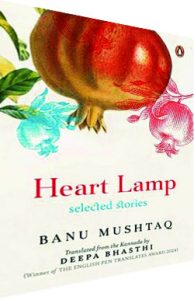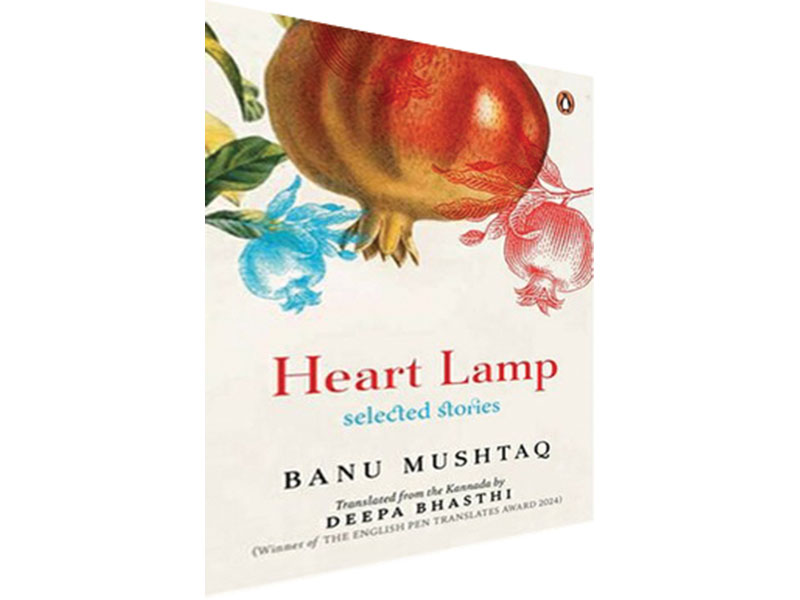No products in the cart.
Pain of the disempowered
 Heart Lamp: selected stories
Heart Lamp: selected stories
Banu Mushtaq, Translated into English from Kannada by Deepa Bhasthi
Penguin random house
Rs.399 Pages 224
This International Booker Prize winner is a collection of socially conscious explorations of identity, and critiques of patriarchal oppression under cover of religion
This collection of a dozen short stories authored by a Kannada writer, the dominant language of the south Indian state of Karnataka, is the surprise dark horse winner of the International Booker Prize 2025 of the London-based Booker Foundation (estb.1969).
The Booker Prize for fiction published in Britain and Ireland and the International Booker Prize (estb.2005) awarded for works of fiction globally, translated into English and published in the UK, are among the world’s most acclaimed literary awards and pay winning authors handsome prize money (£50,000) in each category. Unsurprisingly, competition for the Bookers is intensive.
Against this backdrop the International Booker Prize 2025 awarded to the author is a pinnacle achievement for Hassan-based Banu Mushtaq, a lone feminist, Muslim voice of the Bandaya Sahitya (Rebel Literature) movement of the 1970s and 1980s in Karnataka.
Sensitively translated by Deepa Bhasthi, this book is a selection of a dozen short stories written over three decades by the author, drawing on her first-hand experience as lawyer, journalist and champion of Bandaya Sahitya. The collection takes its title from the sixth story in the collection, a heart-warming tale of how “the lamp in Mehrun’s heart which had been extinguished a long time ago” is lit again by her 16-year-old daughter, Salma, who comforts and understands her mother like a friend and prevents a tragic suicide.
The themes woven into the stories unfold a textured exposure of everyday life in Muslim communities in small towns and villages of south west India; gender relations; patriarchy and submission in middle-class households; inequalities, marginalization and power dynamics in this social sphere. The stories are progressive and conscious explorations of identity and human dignity, critiques of entrenched patriarchal norms and oppression under cover of religion.
Mushtaq evidently believes that every story is worth telling as each reveals the extraordinary challenges endured by women, their stoicism and in rare instances, momentary triumphs.
The collection is a blend of penetrating stories such as Shaista Bhabi’s, who is made to believe that she is the cynosure of her husband’s eye; Naseema, Nayaz Khan’s Saudi-returned sister-in-law, who mocks his homespun wife Asifa; Mehaboob Bi, Yusuf’s dignified mother whom his wife Akhila jealously regards as a savathi/co-wife; Mehrun who is ostracised by her mother, sisters, brothers when she returns to her paternal home without her husband. All these women are trapped in patriarchy, often unable to bond over a shared sisterhood.
For married women the conventional injunction is “You should be obedient… he is God to you, you should do whatever he tells you to, you should serve him loyally.” Protest is condemned, male hegemony is resignedly accepted.
In these stories ingrained religious beliefs, crushing social mores, rituals and observances create a nuanced understanding of human behaviour. Writing from within the Muslim community, Mushtaq courageously spices her stories with humour and sarcasm to describe a range of characters and their actions and behaviour. The mutawalli saheb attached to each masjid as custodian of waqf property, distributes benefits to the faithful as stipulated by the trust. He wields a position of power and wallows in the attention he gets, the petitions he can suppress or grant on a whim, the little perks of his job like biryani and paan, drinking forbidden sharab with which Yakub, the auto-driver bribes him.
Yakub’s wife, Aashraf, waiting at the masjid through the rain, well into the night, clinging to her sick daughter, is ruthlessly kicked and faints even as her child dies. The mutawalli is unmoved: “Maut, hayat, death and life, is in Allah’s hands,” he intones, unaware that the educated Zulekha Begum had explained Sharia law and the rights of Muslim women to Aashraf.
Readers are also reminded of the Shah Bano case of 1985 in which the Supreme Court in a landmark judgement awarded Shah Bano maintenance. But the judgement was over-turned by government legislation prompting the author to observe that men interpret laws for their own benefit, and are against educating women beyond the madrasa. “These people have taken over the Qur’an and the Hadiths.”
Refreshingly in this story, the mutawalli sahib is made to feel guilty of murder and the women of the mohalla hurl abuses at him. Even his wife Amina, mother of his seven children in a gesture of defiance walks out “to get an operation done.”
Open, continuous and uninterrupted oppression of women by way of incessant child-bearing and rearing, fear of talaq, the husband’s right to marry four wives (with most women ignorant of the conditions precedent), demands for dowry instead of paying mehr (bride price) are underlying issues which shape the stories, focused on the fragile position of Muslim women guaranteed equal rights under the Constitution. Even young girls like Asifa and Salma are obliged to sacrifice carefree childhood when forced to become caregivers of younger siblings and perpetually pregnant mothers.
This selection of short fictional stories embodies echoes of oral language, colloquial expressions and a cultural ambience that is brilliantly translated. In her translation Deepa Bhasthi has radically incorporated Kannada, Arabic and Urdu words into English without alienating or exoticising languages by using italics. Use of traditional honorifics — Amma and Abba, Chikkappa and Chikkamma, Bhai Saheb, Bhabhi, Doddamma — create conversational drama rooted in the real and quotidian. The sound of the aazan, recitation of namaz, undertaking the Hajj, saying a dua, recalling a kafan and kabristhan, construct a distinctive value system mandating absolute faith in Allah. Yet in the last story, an unnamed wife thrown on the wayside with her children cries out heartrendingly at the injustice heaped on her: “If you were to build the world again, to create males and females again… Come to earth as a woman, Prabhu!”
In this evocative anthology, Banu Mushtaq has stepped out of her community and regional environment to voice the pain of the disempowered in a multicultural and multilingual world. Literature has provided her what she describes a “space” to celebrate diversity and accept difference enabling her to bridge the distance between the individual and the global community.
Jayati Gupta
Post Views: 94
















Add comment